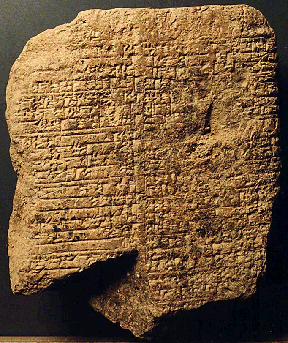*History 8 Mesopotamia Notes
Return to Main Page History 8
Contents
- 1 1. What is the legitimation of authority ?
- 2 2. How was it practiced in Sumer?
- 3 3. How are bureaucrats,writing and the calendar connected?
- 4 4. Define Polytheism.
- 5 5. Was there a belief in the afterlife in Sumerian religion?
- 6 6. Define law and give its three characteristics.
- 7 7. What is Lex talonis?
- 8 8. How did the monarchy change during the Old Babylonian period?
- 9 9. Hammurabi's Code reflected a change in law. What was that change? Why important ?
- 10 10. What group was forced to move from Judah to Babylon? What was their social status?
- 11 11. How was the Semitic domination of Mesopotamia ended?
- 12 12. Why are the Hittites on of the most significant peoples in Mesopotamian history?
- 13 13. How did law change?
- 14 14. What was the Assyrian policy toward conquered peoples and what was the result of this policy?
- 15 15. How do we know about Mesopotamian culture, myth and literature?
- 16 16. What were some of the innovations in warfare begun by the Assyrians?
1. What is the legitimation of authority ?
2. How was it practiced in Sumer?
3. How are bureaucrats,writing and the calendar connected?
4. Define Polytheism.
5. Was there a belief in the afterlife in Sumerian religion?
The Sumerians Believed in the afterlife. The tale of Gilgamesh is centered around finding everlasting life because, like christians, the Sumerian afterlife was a grim place. They saw the afterlife as another life, like a life on earth. They created mummification to ensure a better time in the afterlife. However, the believe that the gods did not occupy some world existentially different from this one, and no rewards or punishments accrued to human beings after death. Human beings simply became wisps within a house of dust; these sad ghosts would fade into nothing within a century or so.
Zoroaster, one of the first to present the idea of one god, believed that those who were good went to a place of paradise and those who were bad went to a fiery hell.
 [1]
http://www2.sjs.org/Beniretto/Mesopotamia/textcomputerexercise.html#Sumerians
[1]
http://www2.sjs.org/Beniretto/Mesopotamia/textcomputerexercise.html#Sumerians
Picture from The British Museum Website.
Julian Chazz Nicholas Peavy
6. Define law and give its three characteristics.
Definition
Law is written and administered retribution and conflict resolution.
Characteristics
- Administration: Law is retribution that is administered by a centralized authority. This means that the punishment does not turn into revenge.
- Writing: Law is written; law assumes an independent character beyond the centralized authority that administers it. This makes sure that the law makers and the law administrators are not exempt from the law.
- Retribution Law is at heart revenge; the basic cultural way for dealing with bad behavior is to exact revenge.

Sources
http://www2.sjs.org/Beniretto/Mesopotamia/textcomputerexercise.html#SumerianLaw visited 11/13/2012,
http://schema-root.org/region/middle_east/iraq/national_library/ picture, viewed 11/13/2012
- Emily Pedrick